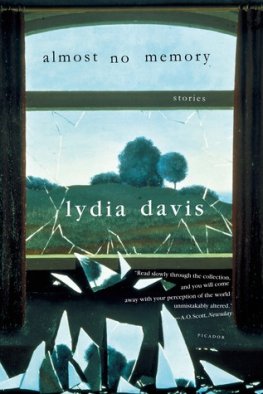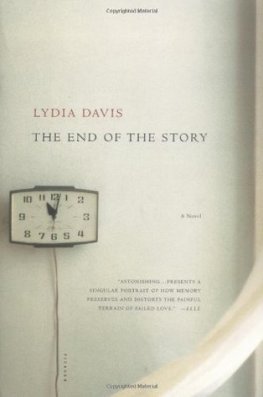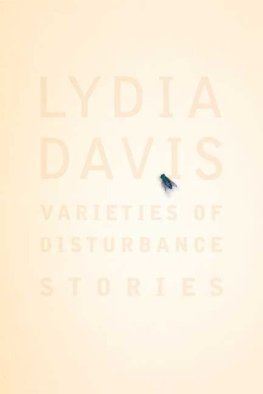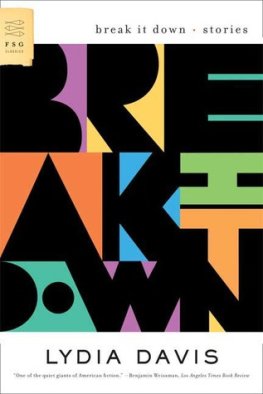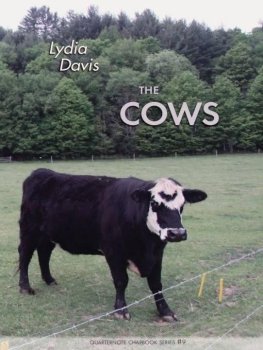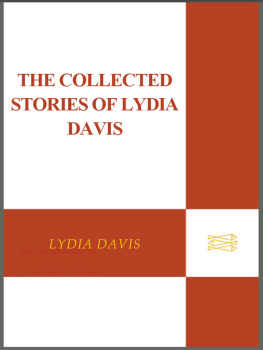Lydia Davis - Almost No Memory
Here you can read online Lydia Davis - Almost No Memory full text of the book (entire story) in english for free. Download pdf and epub, get meaning, cover and reviews about this ebook. year: 2001, publisher: Farrar, Straus and Giroux, genre: Prose. Description of the work, (preface) as well as reviews are available. Best literature library LitArk.com created for fans of good reading and offers a wide selection of genres:
Romance novel
Science fiction
Adventure
Detective
Science
History
Home and family
Prose
Art
Politics
Computer
Non-fiction
Religion
Business
Children
Humor
Choose a favorite category and find really read worthwhile books. Enjoy immersion in the world of imagination, feel the emotions of the characters or learn something new for yourself, make an fascinating discovery.
- Book:Almost No Memory
- Author:
- Publisher:Farrar, Straus and Giroux
- Genre:
- Year:2001
- Rating:3 / 5
- Favourites:Add to favourites
- Your mark:
- 60
- 1
- 2
- 3
- 4
- 5
Almost No Memory: summary, description and annotation
We offer to read an annotation, description, summary or preface (depends on what the author of the book "Almost No Memory" wrote himself). If you haven't found the necessary information about the book — write in the comments, we will try to find it.
Almost No Memory — read online for free the complete book (whole text) full work
Below is the text of the book, divided by pages. System saving the place of the last page read, allows you to conveniently read the book "Almost No Memory" online for free, without having to search again every time where you left off. Put a bookmark, and you can go to the page where you finished reading at any time.
Font size:
Interval:
Bookmark:
Lydia Davis
Almost No Memory
MEAT, MY HUSBAND
My husbands favorite food, in childhood, was corned beef. I found this out yesterday when friends came over and we started talking about food. At some point they asked what our favorite childhood foods had been. I couldnt think of any, but my husband didnt have to think before answering.
Corned beef, he said.
Corned beef with an egg on it! one of our friends added.
My husband often ate in diners before we met. He had two he liked, but he preferred the one where they did a particularly good hot roast beef sandwich. He still likes a good piece of roast beef, or steak, or hamburger mixed with sauce and spices and grilled outdoors with brochettes of onions and peppers.
But Im the one who cooks most of his meals now. Often I make him meals with no meat in them at all because I dont think meat is good for us. Often there is no seafood in them either, because most seafood isnt good for us either, and there is almost never any fish in them, partly because I cant remember which sorts of fish may be safe to eat and which are almost certainly not, but mainly because he likes fish only when its served in a restaurant or cooked in such a way that he cant tell its fish. Often there is no cheese in our meals either, because of the problem with fat. Ill make him a brown-rice casserole, for example, or winter vegetables with parsley sauce, or turnip soup with turnip greens, or white bean and eggplant gratin, or polenta with spicy vegetables.
Why dont you make the foods I like? he asks sometimes.
Why dont you like the foods I make? I answer.
Once I marinated slabs of tofu in tamari sauce, champagne vinegar, red wine, toasted marjoram, and dried Chinese mushrooms simmered in water. I marinated them for four or five days and then served them to him, sliced thin, in a sandwich with horseradish and mayonnaise, slices of red onion, lettuce and tomato. First he said the tofu was still very bland, which is what he always says about tofu, then he said that on the other hand, if he hadnt known it was there, he wouldnt have been able to taste the tofu anyway because there were so many other things in the sandwich. He said it was all right, and then he said he knew tofu was good for him.
Sometimes he likes what I make, and if hes in a good mood he says so. Once I made him a cucumber salad with feta cheese and red onion and he liked it, saying it tasted Greek. Another time I made him a lentil salad with peppers and mint and he liked that, too, though he said it tasted like dirt.
But generally he doesnt like what I cook as much as what he used to eat in diners and certainly not as much as what he used to make for himself before he met me.
For instance, he used to make a roulade of beef cooked in a Marsala sauce. He would take thin slices of top round or sirloin, dust them with flour, coat one side with crushed dill seeds, roll them around cooked Italian sausage meat, and pierce them with a toothpick. Then he would saut them in butter and simmer them in a brown Marsala sauce with mushrooms. He would also make roulades of veal stuffed with prosciutto and Gruyre. Another favorite was a meatloaf of veal, pork, and sirloin. It would contain garlic, rosemary, two eggs, and whole-wheat bread crumbs. He would lay smoked bacon underneath it and on top of it.
Now the loaf I make for him is of ground turkey. It, too, has mushrooms, fresh whole-wheat bread crumbs and garlic in it, but in other ways it is not the same. I make it with one egg, celery, leeks, sweet red peppers, salt and pepper, and a dash of nutmeg.
Outdoors on the deck, he eats it and says nothing, gazing over the water past the willow tree. He is calm and contemplative. I dont think hes calm because Im feeding him so much less meat, but because he is teaching himself to accept what I do. He doesnt like it but knows that I believe Im doing it for his own good.
When he says nothing about the turkey loaf, I question him, and when I press him to answer, he says that its all right but hes not excited about it. He excuses himself by saying that in general hes not very excited about food. I disagree, because I have seen him excited about food, though almost never about what I serve him. In fact, I can remember only one occasion on which he was excited by what I served him.
It was the night I made polenta and spicy vegetables for our dinner, though that was not what excited him. The polenta, spreading in a thick ocher circle under the heap of reddish-brown vegetables, looked strange and reminded us both of a cow patty. When he had eaten some of it, though, my husband said it tasted better than it looked, something he has said before about other meals of mine. The cookbook had suggested a certain dessert to follow: a ripe pear, chilled, with walnuts. As we sat down to our meal, I told my husband what I was planning for dessert, though I was not going to bother chilling the pear.
Thats one of my problems as a cook that I dont bother to do each thing the way it should be done. I dont seem to understand the importance of detail, in cooking. My husband does, and when I told him my plan for dessert, he got right up from the table and put the pear in the freezer to chill.
When we came to eat the pear and the walnuts, the contrast between the cool, juicy sweetness of the fruit and the warmer, oily fragrance of the nuts certainly excited my husband, enough for him to imagine other desserts of fruit poached figs with ginger, apricot fritters, and sliced blood oranges with pecans. Certainly he was more excited about this dessert than he had been about anything else I had served him. But then he was the one who had put the pear in the freezer, and Ive learned by now that when hes involved in preparing a meal, or anything else for that matter, hes more apt to like it.
JACK IN THE COUNTRY
Henry encounters Jack on the street and asks how his weekend with Laura was. Jack says he hasnt spoken to Laura in at least a month. Henry is angry. He thinks Ellen has been lying to him about Laura. Ellen says she has been telling the truth: Laura told her over the phone that Jack was coming for the weekend to her house up there in the country. Henry is still angry, but now he is angry because he thinks Laura was lying to Ellen when she told her Jack was coming up for the weekend. At this point, with embarrassment, Ellen realizes her mistake: more than one Jack is involved here. Laura said only that Jack was coming to visit her for the weekend, and it was not the Jack that Ellen and Henry know but the Jack that only Ellen knows, and only slightly, who was about to arrive at Lauras house in the country. With some misgiving, she explains this to Henry. Now Henry is even angrier than before, but he is angry because Laura has been seeing a Jack he does not know instead of the Jack he knows. He is angry because the Jack he knows is an old friend of Lauras, whereas the Jack he does not know must be a new lover. Henry declares he will not speak to Laura again except to ask her to send back his keys. He will take her name out of his address book and refuse to hear any further mention of her from Ellen or the Jack he knows. Henry cannot know, since he will not speak to Laura, that in fact a third Jack has become involved in this story, to the distress of the second Jack, for Lauras affections have already strayed from the Jack that Ellen knows only slightly and that Henry does not know, and fastened on a Jack in the country unknown to them all.
FOUCAULT AND PENCIL
Sat down to read Foucault with pencil in hand. Knocked over glass of water onto waiting-room floor. Put down Foucault and pencil, mopped up water, refilled glass. Sat down to read Foucault with pencil in hand. Stopped to write note in notebook. Took up Foucault with pencil in hand. Counselor beckoned from doorway. Put away Foucault and pencil as well as notebook and pen. Sat with counselor discussing situation fraught with conflict taking form of many heated arguments. Counselor pointed to danger, raised red flag. Left counselor, went to subway. Sat in subway car, took out Foucault and pencil but did not read, thought instead about situation fraught with conflict, red flag, recent argument concerning travel: argument itself became form of travel, each sentence carrying arguers on to next sentence, next sentence on to next, and in the end, arguers were not where they had started, were also tired from traveling and spending so long face-to-face in each others company. After several stations on subway thinking about argument, stopped thinking and opened Foucault. Found Foucault, in French, hard to understand. Short sentences easier to understand than long ones. Certain long ones understandable part by part, but so long, forgot beginning before reaching end. Went back to beginning, understood beginning, read on, and again forgot beginning before reaching end. Read on without going back and without understanding, without remembering, and without learning, pencil idle in hand. Came to sentence that was clear, made pencil mark in margin. Mark indicated understanding, indicated forward progress in book. Lifted eyes from Foucault, looked at other passengers. Took out notebook and pen to make note about passengers, made accidental mark with pencil in margin of Foucault, put down notebook, erased mark. Returned thoughts to argument. Argument not only like vehicle, carried arguers forward, but also like plant, grew like hedge, surrounding arguers at first thinly, some light coming through, then more thickly, keeping light out, or darkening light. By arguments end, arguers could not leave hedge, could not leave each other, and light was dim. Thought of question to ask about argument, took out notebook and pen and wrote down. Put away notebook and returned to Foucault. Understood more clearly at which points Foucault harder to understand and at which points easier: harder to understand when sentence was long and noun identifying subject of sentence was left back at beginning, replaced by male or female pronoun, when forgot what noun pronoun replaced and had only pronoun for company traveling through sentence. Sometimes pronoun then giving way in mid-sentence to new noun, new noun in turn replaced by new pronoun which then continued on to end of sentence. Also harder to understand when subject of sentence was noun like thought, absence, law; easier to understand when subject was noun like beach, wave, sand, sanatorium, pension, door, hallway, or civil servant. Before and after sentence about sand, civil servant, or pension, however, came sentence about attraction, neglect, emptiness, absence, or law, so parts of book understood were separated by parts not understood. Put down Foucault and pencil, took out notebook and made note of what was now at least understood about lack of understanding reading Foucault, looked up at other passengers, thought again about argument, made note of same question about argument as before though with stress on different word.
Font size:
Interval:
Bookmark:
Similar books «Almost No Memory»
Look at similar books to Almost No Memory. We have selected literature similar in name and meaning in the hope of providing readers with more options to find new, interesting, not yet read works.
Discussion, reviews of the book Almost No Memory and just readers' own opinions. Leave your comments, write what you think about the work, its meaning or the main characters. Specify what exactly you liked and what you didn't like, and why you think so.

